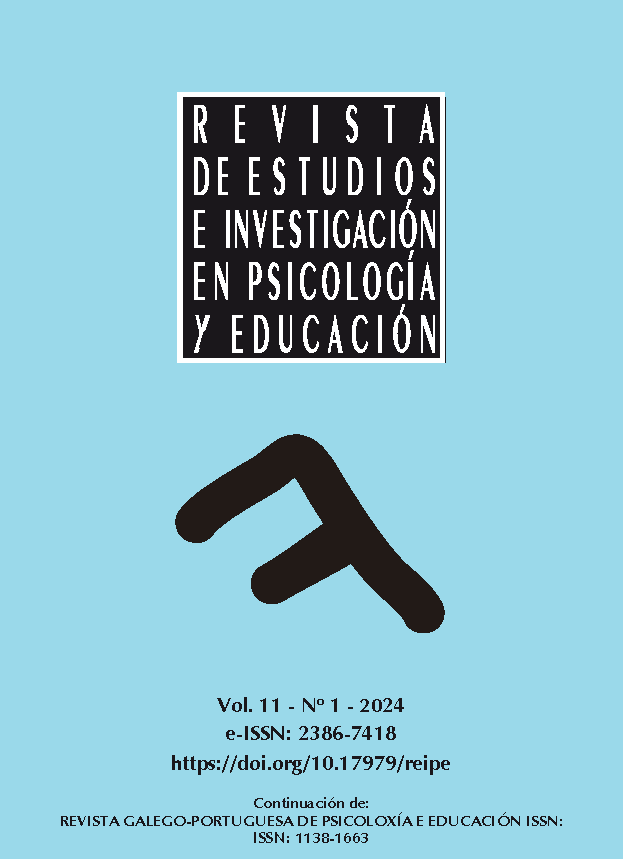Percepciones de los estudiantes de secundaria sobre el modelo flipped classroom en un contexto en línea
Contenido principal del artículo
DOI:
https://doi.org/10.17979/reipe.2024.11.1.10024Resumen
Durante la pandemia, el modelo de aula invertida (flipped classroom model - FCM) totalmente en línea se convirtió en una alternativa al FCM híbrido. Para evaluar la aplicación del FCM en un contexto en línea, se llevó a cabo un estudio de investigación-acción con estudiantes de secundaria portugueses que combinaba clases asíncronas y síncronas. El diseño de las clases se basó en el Modelo 5E: Engage, Explore, Explain, Elaborate and Evaluate. Los datos se recogieron mediante un cuestionario y las interacciones de los/as estudiantes en las actividades sincrónicas. Los resultados muestran que las lecciones asíncronas estimularon el interés de los estudiantes por el tema (Engage), permitiéndoles adquirir una comprensión inicial del mismo (Explore) y demostrar el aprendizaje adquirido (Explain). Las clases sincrónicas pusieron de relieve el papel activo del alumnado en la resolución de problemas complejos en grupo y en la ampliación del aprendizaje autónomo (Elaborate y Evaluate). Sin embargo, en el proceso de ampliación de su aprendizaje, se observó que los/as estudiantes confiaban más en la retroalimentación inmediata del profesorado que en la de sus compañeros/as. Los resultados del estudio confirman que el FCM se adecua al entorno en línea y fomenta la personalización del aprendizaje personalizado y la autonomía del alumnado.
Palabras clave:
Descargas
Detalles del artículo
Referencias
ARAGON, Steven; & JOHNSON, Elaine (2008). Factors Influencing Completion and Noncompletion of Community College Online Courses. American Journal of Distance Education, 22(3), 146-158. https://doi.org/10.1080/08923640802239962
BARDIN, Laurence (2011). Análise de Conteúdo. Edições 70.
BYBEE, Rodger; TAYLOR, Joseph; GARDNER, April; SCOTTER, Pamela; POWELL, Janet; WESTBROOK, Anne; & LANDES, Nanci (2006). The BSCS 5E instructional model: origins and effectiveness. BSCS.
DELOZIER, Shara; & RHODES, Matthew (2017). Flipped Classrooms: a Review of Key Ideas and Recommendations for Practice. Educational Psychology Review, 29(1), 141-151. https://doi.org/10.1007/s10648-015-9356-9
ESPINO-DÍAZ, Luis; ALVAREZ-CASTILLO, Jose-Luis; GONZALEZ-GONZALEZ, Hugo; HERNANDEZ-LLORET, Carmen-Maria; & FERNANDEZ-CAMINERO, Gemma (2020). Creating Interactive Learning Environments through the Use of Information and Communication Technologies Applied to Learning of Social Values: An Approach from Neuro-Education. Social Sciences, 9(5), 1-8. https://doi.org/10.3390/socsci9050072
HAFTADOR, Alierza Mortezaei; SHIRAZI, Fatemeh; & MOHEBBI, Zinat (2021). Online class or flipped-jigsaw learning? Which one promotes academic motivation during the COVID-19 pandemic? BMC Medical Education, 21(1), 499. https://doi.org/10.1186/s12909-021-02929-9
HEW, Khe Foon; JIA, Chengyuan; GONDA, Donn Emmanuel; & BAI, Shurui (2020). Transitioning to the “new normal” of learning in unpredictable times: pedagogical practices and learning performance in fully online flipped classrooms. International Journal of Educational Technology in Higher Education, 17(1), 57. https://doi.org/10.1186/s41239-020-00234-x
HEW, Khe Foon; & LO, Chung Kwan. (2018). Flipped classroom improves student learning in health professions education: a meta-analysis. BMC Medical Education, 18(1), 38. https://doi.org/10.1186/s12909-018-1144-z
HEW, Khe Foon; TANG, Ying; LO, Chung Kwan; & ZHU, Yanzhen (2018). Examining a WeChat-supported 5E-flipped classroom pedagogical approach. International Journal of Services and Standards, 12(3/4), 224. https://doi.org/10.1504/IJSS.2018.100217
JIA, Chengyuan; HEW, Khe Foon; BAI, Shurui; & HUANG, Weijiao (2021). Adaptation of a conventional flipped course to an online flipped format during the Covid-19 pandemic: Student learning performance and engagement. Journal of Research on Technology in Education, 54(2), 281-301. https://doi.org/10.1080/15391523.2020.1847220
KEMMIS, Stephen (2007). Action research. In Martin Hammersley (Ed.), Educational Research and Evidence-based Practice (pp. 167-180). Sage Publications.
LAI, Hui-Min; HSIEH, Pi-Jung; UDEN, Lorna; & YANG, Chang-Ho (2021). A multilevel investigation of factors influencing university students’ behavioral engagement in flipped classrooms. Computers & Education, 175, 104318. https://doi.org/10.1016/j.compedu.2021.104318
LAM, Yau Wai; HEW, Khe Foon; & JIA, Chengyuan (2022). Toward a flipped 5E model for teaching problem- solution writing in ESL courses: A two-year longitudinal experiment. Language Learning & Technology, 26(1), 1-40. http://hdl.handle.net/10125/73467
LO, Chung Kwan; & HEW, Khe Foon (2017). A critical review of flipped classroom challenges in K-12 education: possible solutions and recommendations for future research. Research and Practice in Technology Enhanced Learning, 12(1), 4. https://doi.org/10.1186/s41039-016-0044-2
LO, Chung Kwan; & HEW, Khe Foon (2022). Design principles for fully online flipped learning in health professions education: a systematic review of research during the COVID-19 pandemic. BMC Medical Education, 22(1), 720. https://doi.org/10.1186/s12909-022-03782-0
MÁXIMO- ESTEVES, Lídia (2008). Visão Panorâmica da Investigação-Acção. Porto Editora.
MCLAUGHLIN, Jacqueline; GRIFFIN, LaToya; ESSERMAN, Denise; DAVIDSON, Christopher; GLATT, Dylan; ROTH, Mary; GHARKHOLONAREHE, Nastaran; & MUMPER, Russel (2013). Pharmacy Student Engagement, Performance, and Perception in a Flipped Satellite Classroom. American Journal of Pharmaceutical Education, 77(9), 196. https://doi.org/10.5688/ajpe779196
REEVE, JohnMarsshall (2009). Why Teachers Adopt a Controlling Motivating Style Toward Students and How They Can Become More Autonomy Supportive. Educational Psychologist, 44(3), 159-175. https://doi.org/10.1080/00461520903028990
RIBEIRINHA, Teresa; & SILVA, Bento Da (2020). Avaliando a eficácia da componente online da “Sala de aula investida”: um estudo de investigação-ação. Revista E-Curriculum, 18(2), 568-589. https://doi.org/10.23925/1809-3876.2020v18i2p568-589
SOINTU, Erkko; HYYPIÄ, Mareena; LAMBERT, Matthew; HIRSTO, Laura; SAARELAINEN, Markku; & VALTONEN, Teemu (2023). Preliminary evidence of key factors in successful flipping: predicting positive student experiences in flipped classrooms. Higher Education, 85(3), 503-520. https://doi.org/10.1007/s10734-022-00848-2
TANG, Tao; ABUHMAID, Atef; OLAIMAT, Melad; OUDAT, Dana; ALDHAEEBI, Maged; & BAMANGER, Ebrahim (2020). Efficiency of flipped classroom with online-based teaching under COVID-19. Interactive Learning Environments, 31(2), 1077-1088. https://doi.org/10.1080/10494820.2020.1817761
VAN ALTEN, David; PHIELIX, Chris; JANSSEN, Jeroen; & KESTER, Liesbeth (2019). Effects of flipping the classroom on learning outcomes and satisfaction: A meta-analysis. Educational Research Review, 28, 100281. https://doi.org/10.1016/j.edurev.2019.05.003
XU, Bing; CHEN, Nian Shing; & CHEN, Guang (2020). Effects of teacher role on student engagement in WeChat-Based online discussion learning. Computers & Education, 157, 103956. https://doi.org/10.1016/j.compedu.2020.103956



